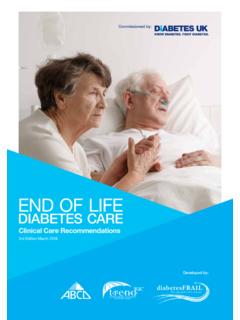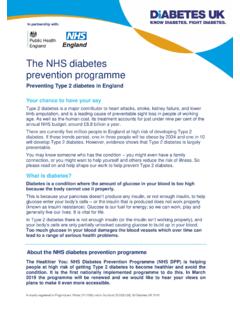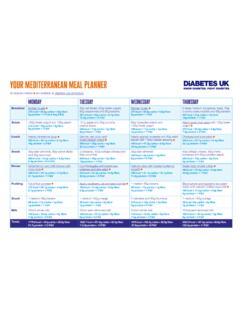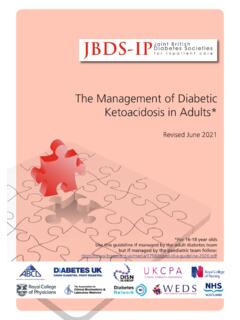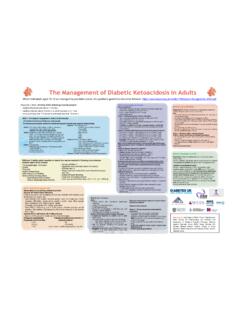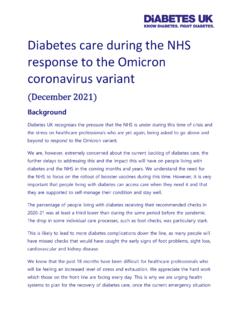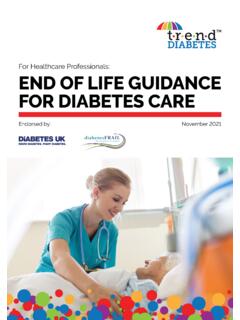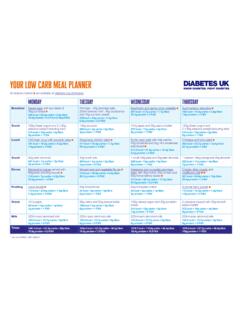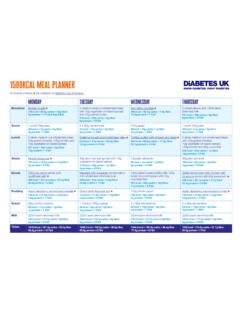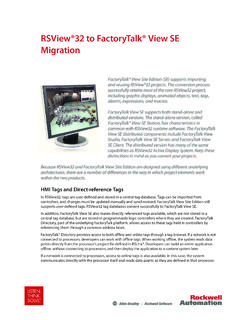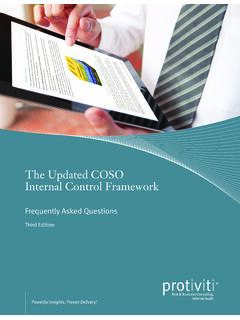Transcription of An Integrated Career and Competency Framework …
1 This Framework has been supported and funded by edition 2018An IntegratedCareer and CompetencyFramework forPharmacists in DiabetesEndorsed byAn Integrated Career and Competency Framework for Pharmacists in DiabetesFirst edition 2018 ForewordThe Royal Pharmaceutical Society commends the work of this group to develop a Framework to support pharmacists managing patients with diabetes. We will continue to work with UKCPA to align to the wider Professional Curricula being developed to support the pharmacy workforce to deliver safe and effective care to patients in all care Bennett CEO RPSC ontentsAcknowledgements ..5 Introduction ..6 How to use this Framework ..9 Work and experiential learning ..10 Reflection and action plan ..14 Competence standards1 General Screening, prevention and early Promoting self-care .. Mental health .. Nutrition .. Glucose and ketone monitoring.
2 Oral therapies .. Injectable therapies .. Hypoglycaemia .. Hyperglycaemia .. Intercurrent illness .. End-of-life care .. Governance, safety and audit ..332 Managing diabetes in General Surgery .. Discharge planning ..393 Pre-conception care .. Antenatal and postnatal care ..424 Diabetes Cardiovascular disease .. Neuropathy .. Nephropathy .. Retinopathy ..515 Role dependent special Prison and young offender units .. Residential and nursing homes .. Paediatrics ..57 References ..60 Appendix 1 Action plan ..61An Integrated Career and Competency Framework for Pharmacists in Diabetes 5 AcknowledgementsMany thanks to all the members of the UK Clinical Pharmacy Association (UKCPA) Diabetes & Endocrinology Group who provided much advice and commentary on this first edition . In addition, many thanks to Debbie Hicks, Jill Hill and June James and the work of the TREND-UK committee (Training, Research and Education for Nurses in Diabetes), whose members allowed us to use their validated Framework as a bASIs for pharmacists.
3 The following individuals reviewed, updated and developed the TREND Framework into one specific for the pharmacist profession:Lead author:Victoria Ruszala, Specialist Pharmacist Diabetes and Endocrinology, North Bristol NHS : Philip Newland-Jones, Consultant Pharmacist in Diabetes and Endocrinology, University Hospital Southampton NHS Foundation Trust Sallianne Kavanagh, Lead Pharmacist for Diabetes and Endocrinology, Sheffield Teaching Hospitals NHS Foundation Trust Michelle Lam, Highly Specialist Pharmacist, Leeds Teaching Hospitals NHS Foundation Trust Hannah Beba, Highly Specialist Pharmacist, County Durham and Darlington NHS Foundation Trust Natasha Jacques, Principal Pharmacist Specialist Services, Heart of England NHS Foundation Trust Elizabeth Hackett, Medicines Information Manager, University Hospitals Leicester NHS Trust Anna Hodgkinson, Specialist Diabetes Pharmacist, Lambeth Diabetes team Barry Keenan, Senior Clinical Pharmacist, Southwest Acute Hospital Northern Ireland Sheilla Louis, Senior Pharmacist, HMP Brixton Claire Oates, Specialist Clinical Pharmacist.
4 North Bristol NHS Trust on behalf of the UK Renal Pharmacy Group. Shailen Rao, Gupinder Syan, Anna Prescott on behalf of Soar Beyond team. UKCPA 20186 An Integrated Career and Competency Framework for Pharmacists in DiabetesIntroductionDiabetes is a common and complex condition affecting all aspects of the individual s life, with potentially costly and life-changing complications. Self-management skills are an essential part of diabetes care, which should be exercised in conjunction with the support of well-trained healthcare providers (HCPs) working within an Integrated Framework , at the centre of which is the person with is a new area of speciality for pharmacist practice, however the profession has been involved in some aspects of the care of people with diabetes for many years. New specialist roles are being developed, as well as the skills and knowledge of pharmacists working in new sectors, such as general practitioner (GP) practice pharmacists.
5 Pharmacists working at all levels in diabetes care can contribute to the process of commissioning and delivering the ideal diabetes service for their population. They can be at the forefront in delivering care, whether providing advice and supporting self-care in the community, performing the annual review and monitoring in a GP practice, or leading a multi-professional team to deliver a comprehensive number of services, including pump therapy, and inpatient and antenatal care. To deliver care successfully, pharmacists need to be clear about what competencies are required to deliver high-quality diabetes care in a patient-facing role and demonstrate those competencies. Furthermore, experienced pharmacists should be able to assess need and be innovative, and to evaluate and demonstrate that they achieve desired health outcomes. This Framework supports the commissioning of appropriate levels of pharmacists to deliver diabetes services and provides a clear definition of the pharmacist roles and their expected competencies within diabetes is no single recognised qualification for a diabetes specialist role.
6 Every pharmacist must meet the nine key standards outlined by the General Pharmaceutical Council, which describe how safe and effective care is delivered. They are a statement of what people expect from pharmacy professionals, and reflect what pharmacy professionals have said they expect of themselves and their colleagues (GPhC, 2017).Over the past few years, the Royal Pharmaceutical Society (RPS) has made it possible for pharmacists to develop their careers in a structured way (RPS, 2013; 2014). The Foundation Pharmacy Framework (FPF) and the Advanced Pharmacy Framework (APF) form useful structures to gather evidence that a candidate s knowledge of core competencies has advanced. They are also used as enabling frameworks to host a range of professional curricula, which identify the key knowledge, skills, experience and behaviours needed in different scopes of practice. This specialist competence An Integrated Career and Competency Framework for Pharmacists in Diabetes 7framework sits alongside the FPF and APF to develop specific competences in the specialty of diabetes.
7 We expect this competence Framework to help develop a portfolio that demonstrates specialist skills and knowledge and therefore meets the needs of both our professional society and specialised individuals. These are the four levels of Competency outlined by the RPS:Foundation (first 1000 days of practice): you know the basics and apply your knowledge to your Stage 1 (1000 days of practice): you are established in a role, performing well, and have advanced beyond your foundation practice years, or are at an early stage of specialisation and advancement beyond your early years of practice: you understand the theory and detail behind recommended practice and manage more complex situations as part of a multidisciplinary Stage 2 (1000+ days of practice): you are an expert in an area of practice and are experienced; you routinely manage complex situations autonomously and are a recognised leader locally or regionally.
8 You have a broad range of complex knowledge, lead changes in practice and provide expert advice in your (>10 years of practice): you are a nationally or internationally recognised leader in an area of expertise, with a breadth of experience and complex knowledge; you are recognised as a leader and initiate changes at a national Framework is designed to help predominantly with cluster 1 of the APF - expert professional practice, although some of the aspects would meet some aspects of other clusters. It is expected foundation level is the minimum achievement of any pharmacist working in diabetes regardless of sector. Advanced stage I, advanced stage II and mastery levels relate to time within the speciality. For example a specialist pharmacist in diabetes would be expected to be practicing at advanced level II or mastery level in the majority of this Framework , as well as addressing the other clusters of the APF such as research and leadership.
9 They would have been working 8-10 years post qualification, with at least 5-7 of those within the pharmacists would be expected to map at foundation level for diabetes to provide safe patient care, with those with a specialist interest working towards advanced level I. Those who hold leadership roles in community, influencing the local and national agenda on patient care in diabetes would be expected to meet competences at higher levels such as advanced stage II and working as a generalist in roles such as GP practice pharmacists or rotational secondary care posts would be expected to be working towards or at advanced I level for the majority of competences, with a few from advanced II depending on role and experience. This could be combined with knowledge and skills from other competence frameworks for long term conditions such as cardiology and respiratory to ensure all round competence in multiple long-term conditions.
10 8 An Integrated Career and Competency Framework for Pharmacists in DiabetesThose who chose to specialise further and become recognised as advanced specialists, including those working in or towards consultant posts would be expected to map their competencies at a minimum of advanced stage II and working towards mastery level for the majority of competence clusters in both this specialist Framework and the for pharmacy professionals will begin in 2018. This process is designed to ensure they benefit from continuing professional development (CPD) and encourage reflection on learning and practice, with a focus on outcomes for people using pharmacy services. A portfolio based on competence assessment can contribute to your learning and development in line with these Integrated Career and Competency Framework for Pharmacists in Diabetes 9 How to use this frameworkThe Framework can be used in several ways to develop pharmacists knowledge and skills.
